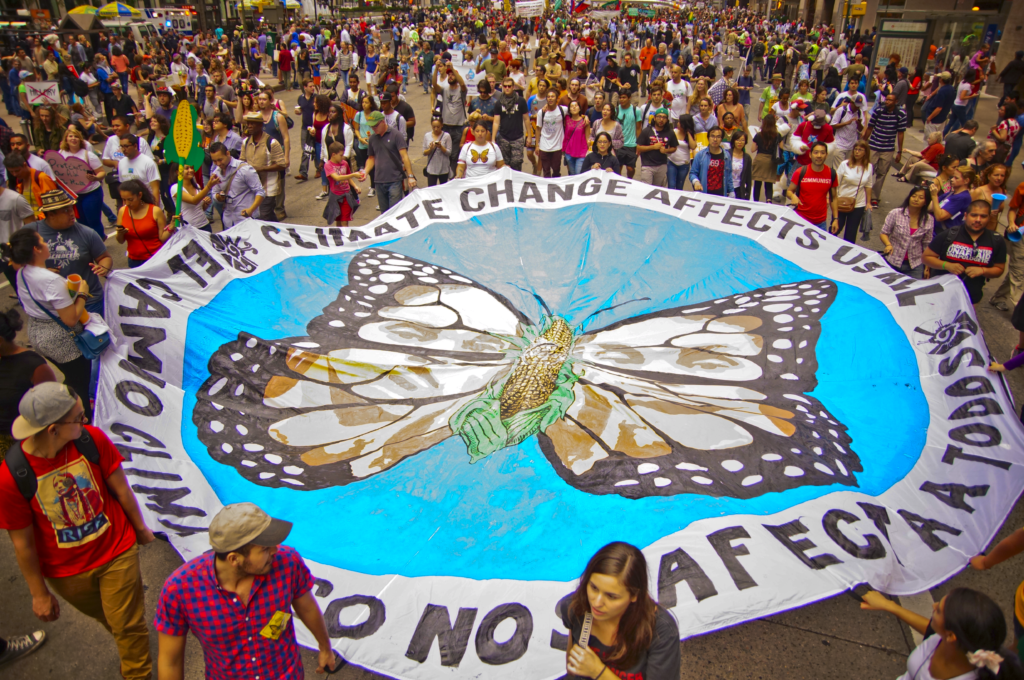At the 23rd Conference of the Parties (COP23) in international climate negotiations, two inspiring and important steps were made toward incorporating human rights and social principles in climate action, in spite of slow progress on establishing the rules to implement the Paris Agreement.
At COP23, negotiators met to create the rulebook (to be adopted in 2018) to implement the Paris Agreement, which will help countries deliver on their commitments under the Agreement. Countries also made preparations for the 2018 Talanoa Dialogue, a process spearheaded by Fiji, the country presiding over this year’s COP. The Dialogue is based on a tradition of inclusive, participatory, and transparent dialogue in Fijian culture. It aims to bring countries together to take stock of their collective efforts and what needs to be done to meet common goals.
CIEL and our partners participated in the negotiations, focusing on three major goals:
- Ensuring that the human rights language of the Paris Agreement be centered in the implementation guidelines;
- Securing decisions that recognize the crucial social dimensions of climate change, such as the linkages between climate action and the rights and knowledge of indigenous peoples; and
- Increasing the ambition of climate action, including through government and corporate accountability, to ensure that global temperature increase does not exceed 1.5 degrees Celsius.
After the Paris implementation guidelines are adopted at COP24 next year, it is unlikely that parties will review the guidelines again. Therefore, it is important to get it right, now. Parties to the Paris Agreement have many existing human rights obligations under other international agreements, and the Paris Rulebook should proactively incorporate those commitments. Parties should not see this process as a burden, but as a constructive approach towards policy coherence. By integrating human rights and environmental and social principles into the Paris implementation guidelines, countries affirm that, to be effective, the implementation of the Paris Agreement must respect these rights and principles. Before COP23, CIEL and partners published Delivering on the Paris Promises, which explains how these principles should be incorporated in the guidelines and how existing obligations and agreements should inform this process.
At COP23, negotiators made less progress toward the completion of the Paris Rulebook than we had hoped. Much of the negotiations still focused on procedural issues, slowing down the more productive and substantive discussions on how to create robust, rights-based implementation guidelines to meet the objectives of the Paris Agreement. Now, negotiators have only thirteen months to finalize the rulebook before COP24 next December.
Nevertheless, key allies among the negotiators have been receptive to advocacy by civil society. Cooperation between civil society and some negotiators contributed to laying the groundwork for a Rulebook that integrates references to human rights.
In spite of the slow progress on the Paris Rulebook, parties made progress in addressing the social dimensions of climate change. There were two accomplishments that stood out:
Gender Action Plan
At COP23, parties adopted the gender action plan. The gender action plan identifies concrete steps to ensure that climate policies contribute to gender equality. Additionally, and building on the language of the Paris Agreement, the gender action plan reinforced the fact that gender, human rights, a just transition for workers, and climate action are deeply connected.
Local Communities and Indigenous Peoples Platform
Governments at COP23 agreed to operationalize the local communities and indigenous peoples platform. This platform aims to draw on traditional knowledge in efforts to mitigate and adapt to climate change and to enhance the capacity for local communities and indigenous peoples to engage in climate talks. After days of intense negotiations, indigenous peoples’ representatives made a great breakthrough by securing language to protect indigenous people’s rights in climate action — including full and effective participation of indigenous peoples and self-selection of representatives in accordance with indigenous peoples’ own procedures.
Beyond concrete achievements, COP23 also served as an important venue for members of civil society to interact with one another. For example, the Human Rights & Climate Change working group seized the opportunity coordinate advocacy for the coming year by sharing knowledge, resources, and capacity that will allow us to be more effective in reaching our shared goals. To facilitate this conversation, CIEL organized side-events on topics such as gender and human rights, and operationalizing links between human rights and climate change.
I found it particularly interesting to learn from others’ experiences as we work collectively to improve our advocacy strategy. It has been profoundly enriching to be around people who truly believe in what they do and who fight every day for human rights.
COP23 set the tone for 2018. There is still a vast amount of work to be done to ensure robust implementation guidelines that respect human rights and adequately prevent climate change: Negotiators must be convinced, trust must be built, constituencies must be reinforced, and wording must be coordinated. But still, we have already seen positive signs for the year ahead. Negotiators have progressively reinforced the momentum around human rights and environmental and social principles created in the lead-up to Paris Agreement.
Further, the progress at this year’s COP highlights the value of civil society observers to climate negotiations. Civil society pushed fora stronger, rights-based Paris Rulebook this year and will continue to play an important role in 2018. It will not be easy. But as we have seen during COP23, we are up to the task.
By Mélissa Dumont, Geneva-based intern
Originally posted on December 8, 2017
Photo credit: John Isaac/Flickr

